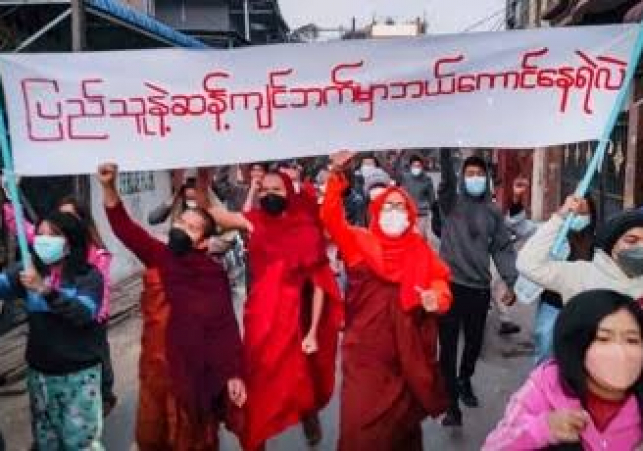

On the one-year anniversary of the army's seizure of power in Myanmar, a nationwide strike was held on Tuesday, as intermittent protests and violence around the country stoked worldwide concern about the country's ongoing power struggle.
People stayed at home and businesses closed their doors as a countrywide "silent strike" emptied out streets in Myanmar's largest city, Yangon, and other towns, according to photos and video posted on social media.
Clashes and bloodshed were also reported as the country grapples with an insurgency that some United Nations experts are now describing as a civil war.
According to local media, an explosion during a pro-military gathering in a town near the Thai border killed at least two people and injured scores more. The cause of the explosion remained unknown at the time.
The military took power on February 1, 2021, overthrowing Aung Suu Kyi's elected administration, which was ready to begin a second term in office after earning a landslide victory in the previous year's November election.
Following the army's takeover, there were widespread nonviolent protests, but armed resistance erupted after the rallies were put down with lethal force. Approximately 1,500 civilians have been killed, yet the government has been unable to put down the insurgency.
The anniversary has also drew international attention, particularly from critics of the military takeover, such as the United States and Western nations.
In a statement, President Joe Biden urged the military to reconsider its actions, release former leader Aung San Suu Kyi and other inmates, and put Myanmar back on the path to democracy.
The US placed further penalties on Myanmar authorities on Monday, in addition to those already in place against top military officers. The restrictions put a freeze on any assets the officials on the list may have in the United States and prevent Americans from doing business with them. Similar measures have been announced in the United Kingdom and Canada.
An intensification of violence, a deepening of the human rights and humanitarian crises, and a rapid rise in poverty in Myanmar, according to a statement from UN Secretary-General António Guterres' office, necessitated an immediate reaction.
People in Myanmar rushed to acquire supplies before the strike began on Tuesday, and shoppers in Yangon looked to have completed their shopping on Monday.
Before the strike began, pro-democracy flash mob marches were held in numerous locations in the early morning hours, when clashes with police and troops are less possible.
On Monday, local media claimed that fighting was still ongoing in Yangon, with at least six explosions thought to have been carried out by resistance troops.
A seven-year-old boy living nearby was killed by a stray bullet when police shot at a car fleeing the scene, according to The 74 Media, a local online news outlet.
Another bombing occurred early Tuesday morning at a police station in Myitkyina in northern Kachin state, where a seven-year-old boy living nearby was killed by a stray bullet when police shot at a car fleeing the scene. Other stories of the occurrence surfaced on social media, including photographs of the boy's modest wooden home and what seemed to be a blood-stained pillow.
Daily guerrilla attacks are carried out by opposition militants, while the military conducts large-scale assaults in rural regions, including air strikes, which are responsible for numerous civilian deaths.
Young protesters, including Buddhist monks, held spirited but peaceful protests at dawn in cities such as Yangon, Mandalay, and Sagaing, despite tight security. They carried banners and chanted anti-military slogans.
Many others also raised three fingers in a resistance salute inspired by the film "The Hunger Games" and used by pro-democracy activists in Thailand.
Authorities had threatened retailers with arrest if they closed for the opposition's strike, but those that were open Tuesday appeared to be empty.
Since last week, the government has issued public warnings via state-run media that anyone participating in the strike could face prosecution, imprisonment, and property confiscation.
According to reports in the state-run daily Myanma Alinn Daily, dozens of business owners who had announced their plans to close were jailed.
Other efforts were taken by the military-installed government to try to derail the strike. To entice crowds, city officials in Yangon and Mandalay planned special events, including a bike competition. According to leaked documents uploaded on social media, city workers in Yangon were urged to come to work during strike hours.
Several pro-military demonstrations were also held, which were widely assumed to be orchestrated by the authorities.
According to a reporter with the online local Tachileik News Agency, an explosion at a pro-government demonstration in Tachileik, a border town in Shan state in eastern Myanmar, killed two people and injured at least 37 others, including six badly wounded.
The majority of the marchers were ex-soldiers or locals brought in for the rally, according to the reporter, who declined to disclose his identity due to the political sensitivity of such material.
There has been no claim of responsibility for the explosion, which was also reported by other news organisations.
Prior to the anniversary of the army's takeover, both sides' leaders delivered addresses over the airwaves.
Acting president of the opposition's National Unity Government, Duwa Lashi La, declared that his group will continue the "revolution" of the people against military authority. The NUG, which was founded by elected legislators, regards itself as the country's legal administrative authority and has garnered the support of many citizens. It has been labelled a "terrorist" organisation by the military.
Senior Gen. Min Aung Hlaing, the military-installed government's commander, gave an hour-long speech in which he promised a "real and disciplined multiparty democratic system" and called for cooperation "so that the country and people can have a better future." Myanmar's military said it took control because of widespread voting fraud in the 2020 elections - an allegation that impartial election observers say they haven't seen any meaningful evidence for.
Also read : Queen Elizabeth II will celebrate her 70th year as monarch